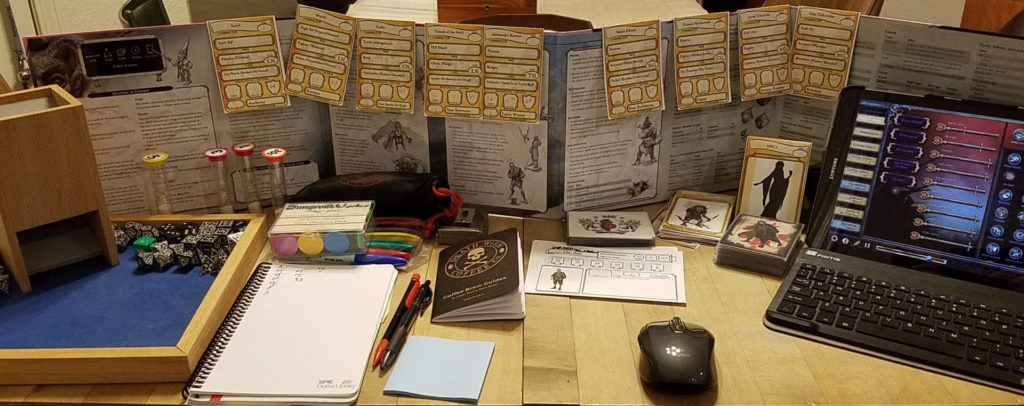This post contains affiliate links to our partners; this means if you click on the link and purchase the product we receive a small commission at no extra charge to you. All opinions remain our own.
Everyone is busy, all the time. When we aren’t working (and we’re all working a lot nowadays), we have plans. When we don’t have plans, we have projects. And when we don’t have projects, we just need some time to relax.
And, if you are a DM, you need to find time in that busy schedule to map out the next dungeon, prepare a dozen characters for a tavern, make a new random encounter table, and help the rookie make a new character. All before Saturday, and preferably without sacrificing your sanity while you’re at it.

So, how do you make it work? How do you plan out satisfying, fun sessions in the limited amount of time between each one? Well, you’re in luck: there are many things that you can do in order to make the most of your limited time, and deliver awesome games despite the time crunch!
Prioritize the Essentials
More than anything else, a busy DM must learn to prioritize. Sometimes, you will not be able to get everything you want to get done before a session. So, what you should do instead is create a list of the most important things to accomplish before next session, in order. That way you can work through the most important things first. This ensures that, even if you aren’t able to accomplish everything, you’ve got the most critical parts done.
While this will vary slightly from table-to-table (and week-to-week), my list usually looks something like this:
- New Character Creation: This is always my first priority. Whether it be a new player stepping in, or a new character for an existing player, it is absolutely essential that you are able to find time before the session to help them through character creation, so that they can jump right in on game day. Without your players, you don’t have a game, and prioritizing their new characters should be the first thing on your mind when it comes to prep work.
- The Next Encounter: If you know your players are going to encounter something next session (especially in a combat that requires a battle-map), you should have that planned and ready. You want to know the geography, enemy stats and personalities, rewards, and any gimmicks in advance.
- Reference Material: While much of this can be recycled session-to-session, you should always take time to prepare any required random encounter tables, magic item descriptions, stat blocks, and pre-written descriptions in advance. This will mean less page-flipping and “hang on a moment” moments on game day.
- NPCs and Quests: Though NPCs and their questlines are often at the heart of your campaign, they are often not at the top of my priority list. This is because quests tend to last a few sessions, and so preparing future quests or quest steps can often wait. Plus, both quests and NPCs are among the easier things in most games to improvise (see later section).
- The Main Plot: If you have a large overarching plot to your game, it should usually take bottom priority when it comes to week-per-week planning. Why? Because your main plot (campaign and/or adventure) should already be planned when you begin it, at least in broad enough strokes for you to guide your players through it. While there are times when we all need to fix up small issues with the larger plot (especially when troublesome players love to break it), those small fixes should rarely, if ever, be made in place of the earlier items on the list.
Prep Before the Campaign
As a DM, preparedness is one of your most important duties. The more you are ready for anything, the easier and smoother it will be at the table to DM, and the more fun everyone will have. But, as we discussed, sometimes the time between sessions simply isn’t enough to prepare enough for that. So, what can be done? Be prepared before you even begin.

Before you start a campaign, you have as much time as you need to plan and prepare, and should use that to its full potential. This is why I recommend busy DMs start planning games at least a month before session 0. This way, they can put a month’s worth of prep work into the campaign, making it that much easier to keep up with preparation once the game actually begin. One book that I’d highly recommend for this to any DM playing in D&D is the Return of the Lazy Dungeon Master.
The best thing to do with that time is create generally useful reference material, large-scale quests, and flesh out major worldbuilding details. I’d recommend having as many random tables, NPC introductions and personalities, quest hooks, and descriptions for major locations done as you can before even starting the game. Since you, as the DM, know a lot of the things the characters will be encountering, that means that you can prepare as much of that content as possible, leaving you to worry about things that crop up organically once the game starts.
Obviously, this advice will not help if you are already in the midst of a campaign, committed to meeting (and therefor preparing) once a week for a session. However, this is advice for your next campaign, or for those DMs with the foresight to plan around their busy schedules before the game even begins.
Published adventures can be a huge boon to a busy DM. While many (probably most) DMs love to create a homebrewed world, filled with custom characters and quests, and to take the players on a never-before-seen adventure, a busy DM should keep in mind that this might not always be possible if their schedule doesn’t permit.

Luckily, pre-made adventures exist in essentially every TTRPG, which cater to any level of progression, style of play, and tone imaginable. There is nothing wrong with playing from a high-quality adventure, and it allows you to skip dozens of hours of preparation so that you can jump straight into a campaign (perhaps with some custom content, to keep it interesting).
Improvise!
Role-playing games are, at their core, improvisational. As a DM, you already know that your job description includes the ability to describe something on the fly, or converse as an NPC, complete with a unique voice, quest, and gimmick.
So, since you’re already improvising so much, don’t be afraid to improvise more! The characters end up in dungeon you didn’t finish mapping out yet? Improvise! Don’t know where the quest leads after the merchant gets kidnapped? Improvise! Realize you forgot your ‘level 14 flooded sylvan woodlands at night in the rain’ encounter table? Improvise!

Of course, this is easier said than done, but there are a few tips I can give you to deliver better quality improvisation, even of things that would usually be prepped.
- Know the rules: whatever system you are doing, you should make sure that you know the rules as deeply as possible. Not only does this ensure that your improvisation will work within the rules of the game, but rulebooks are also filled with guidelines and advice for how to concoct certain scenarios. The better you know that advice, the better you will be able to think of something on the spot which works within the game’s system and the group’s style of play.
- Know your players: when you encounter something that you have no plans for, look outward. You are playing a communal game, why not consider what would be most enjoyable for the community? Perhaps your table loves deadly combat: throw a lumbering behemoth at them, and add in an environmental obstacle. Maybe they want to solve things in more clever ways: well, a secret room or gullible henchman might make them happy. Perhaps they’ve been talking about needed new gear recently: time for a market, filled with whatever they might need — at a price.
- Be confident: it can be easy to become flustered when you are operating “in the blind.” Your players will notice that, and if you seem unprepared, it can drag down the experience by making them feel that they aren’t on a planned quest in a fleshed-out world, but rather at the liberty of the DM’s make-believe-time-with-rules. The best way to combat this is to be confident in what you say: when you make something up on the fly, do so with the same gusto you would as if you’d had it in your notes for months. It can be difficult to build that confidence, but putting in that mental effort is worth it if it means a better game.
If you want some good advice on how to improvise well, you can find it in a surprising place: the 4th Edition Dungeon Master’s Guide is filled with excellent advice for any DM, even outside of it’s edition and game.
PS, never let your players know when you don’t have a plan. Ever.
About Your Limits:
Know When to Push Through…
Sometimes, you just have to head to the grindstone and commit to giving up some relaxation and free time in order to plan the next session. It is best to think about how much work you will need to do before next session, and commit to doing a certain amount of that each day. Scheduling will be the key, here. Sometimes, in order to make something work, there isn’t a workaround, and you will just have to accept that you’ll need to find some time to do some tasks, even amidst your busy schedule.
…And Know When to Pull Back
The most important piece of advice: your wellbeing is more important than any game, and you won’t be able to run a fun game if you are constantly stressed about it. If you are risking burnout, or you consistently can’t get done everything you need to even after these tips, it may be time to reduce your workload. Add an extra week between sessions, wrap up the campaign and let someone else DM next, or maybe even let the game take a hiatus for a month or two. Roleplaying games are meant to be fun for those involved, DM included, and if you aren’t having fun, but rather feeling like the game is becoming a chore (or, worse, a job), then that is a sign you should pull back until you can enjoy it again.

At the end of the day, it is up to you to recognize when you are putting in too much work. It is up to you to respect yourself and your players enough to make decisions based on that knowledge. You are the busy DM, having to balance the table-top game with all your other commitments. Hopefully, the advice in this article will help you do that.